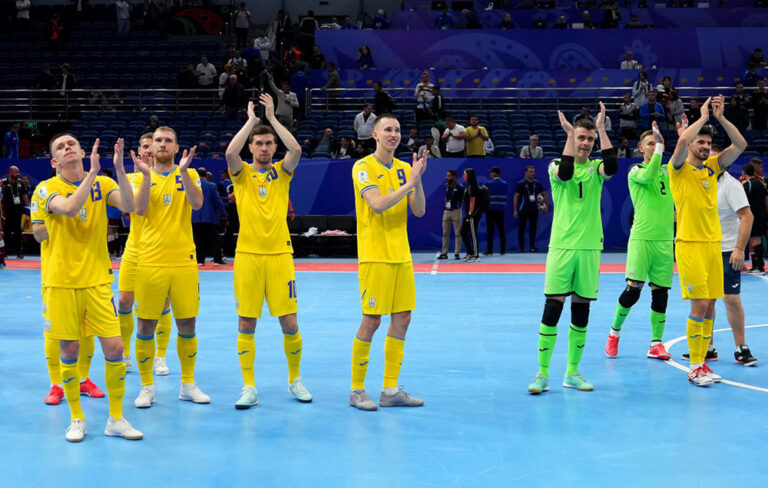The semi-final stage of the FIFA Futsal World Cup delivered two captivating encounters at Tashkent’s Humo Arena, with both matches showcasing the tactical evolution and competitive depth that has transformed modern futsal.
Ukraine vs Brazil: Resilience Meets Experience
The opening semi-final proved to be a masterclass in momentum shifts and tactical adaptation. Ukraine, appearing in their first World Cup semi-final since the mid-nineties, demonstrated remarkable courage against the five-time champions, taking the lead through Cherniavskyi in the first half. The goal came from a well-constructed attack that caught Brazil’s defense off-guard, silencing the packed crowd who had expected Brazilian dominance.
Brazil’s response in the second half was swift and decisive. The turning point came when Ukraine’s Semenchenko deflected a Brazilian cross into his own net, immediately followed by Dyego’s clinical finish just moments later. This rapid-fire double demonstrated Brazil’s ability to capitalize on crucial moments – a quality that would prove decisive throughout their campaign.
Ukraine’s character shone through as they refused to surrender. Korsun’s equalizer, created through intelligent combination play with Abakshyn, brought the match level and showcased the tactical sophistication that had carried them to this stage. However, Ukraine’s aggressive pressing eventually led to their downfall when they exceeded their foul limit, handing Brazil a crucial double penalty that Dyego converted to complete his match-winning performance.
The tactical battle was particularly fascinating, with Ukraine’s direct attacking approach unsettling Brazil’s typically organized defense. This blueprint would later influence tactical preparations for the final, as noted by the FIFA Technical Study Group.
Argentina vs France: History in the Making
The second semi-final was equally compelling, featuring France’s historic debut in a World Cup semi-final against Argentina’s tournament experience. With a capacity crowd creating an electric atmosphere, this match represented a clash between emerging futsal nations and established powerhouses.
Argentina’s narrow victory was built on their characteristic blend of physicality, organization, and technical brilliance. The match showcased Argentina’s ability to adapt their tactical approach, switching effectively between different formations while maintaining their intense pressing system that had troubled opponents throughout the tournament.
France’s performance was remarkable considering their tournament debut status. Having never previously reached the knockout phase of any major tournament, their journey to the semi-finals represented a seismic shift in European futsal dynamics. Their approach of using constant dribbling and blind-side runs to break Argentina’s press provided valuable tactical insights that would influence the final’s preparation.
The narrow defeat couldn’t diminish France’s achievement in reaching this stage, marking them as a genuine force in international futsal and highlighting the sport’s global growth.
Tactical Evolution and Strategic Insights
Both semi-finals revealed the tactical sophistication that has elevated modern futsal. Brazil’s ability to deploy varied goalkeeper strategies – utilizing both Willian’s defensive solidity and Guitta’s technical distribution – demonstrated the multi-dimensional approach required at the highest level. Meanwhile, Argentina’s success stemmed from their disciplined defensive organization combined with the pace and skill of their wing players.
The matches also highlighted the importance of mental resilience, with both Brazil and Argentina showing championship mentality in crucial moments. Brazil’s coach Marquinhos Xavier later reflected on how the team’s multi-year development cycle had prepared them for these pressure situations.
Setting the Stage for a Classic Final
These semi-finals perfectly positioned the tournament for its climactic South American showdown. Brazil’s path through Ukraine’s determined resistance and Argentina’s victory over France’s historic run created compelling narratives heading into the final. The tactical lessons learned from these matches – Ukraine’s direct approach against Brazil and France’s press-breaking techniques against Argentina – would influence both teams’ final preparations.
The semi-finals also confirmed the global growth of futsal, with Ukraine achieving their best-ever World Cup finish and France announcing themselves as a major force. This expansion of competitive depth has transformed the tournament from a predictable affair into a genuinely unpredictable spectacle where traditional powerhouses must earn every victory against increasingly sophisticated opposition.
With Brazil seeking their sixth title after more than a decade-long drought and Argentina aiming to add to their previous triumph, the stage was set for a final that would showcase the very best of modern futsal at Tashkent’s Humo Arena.

